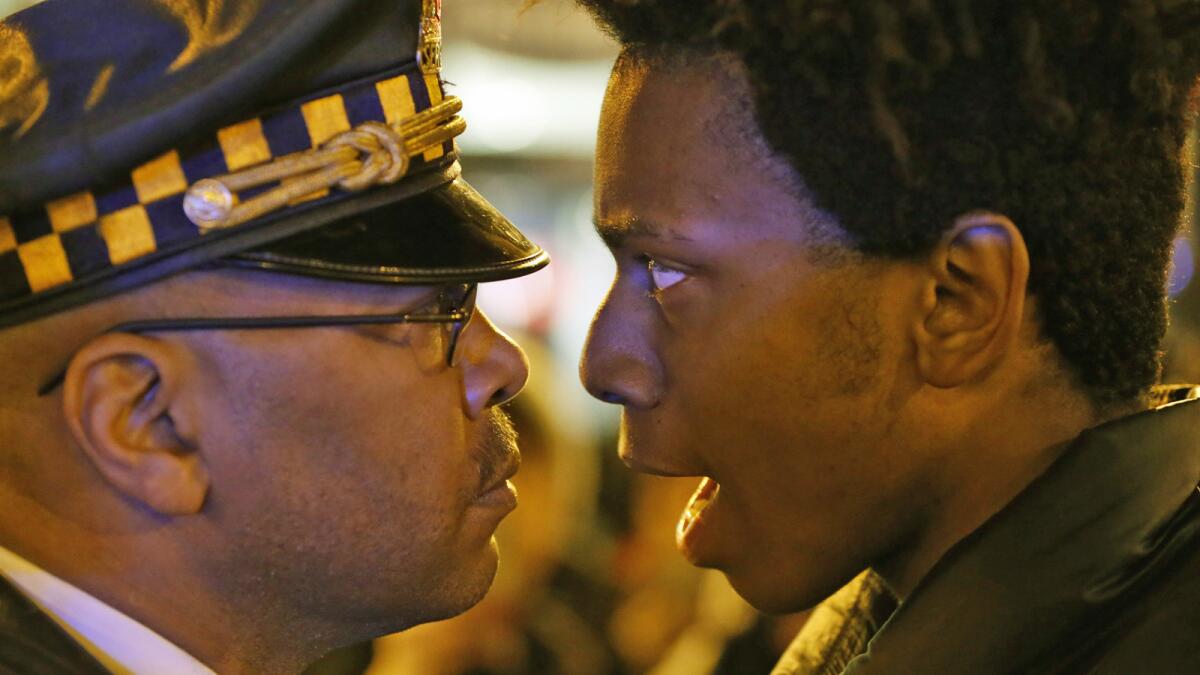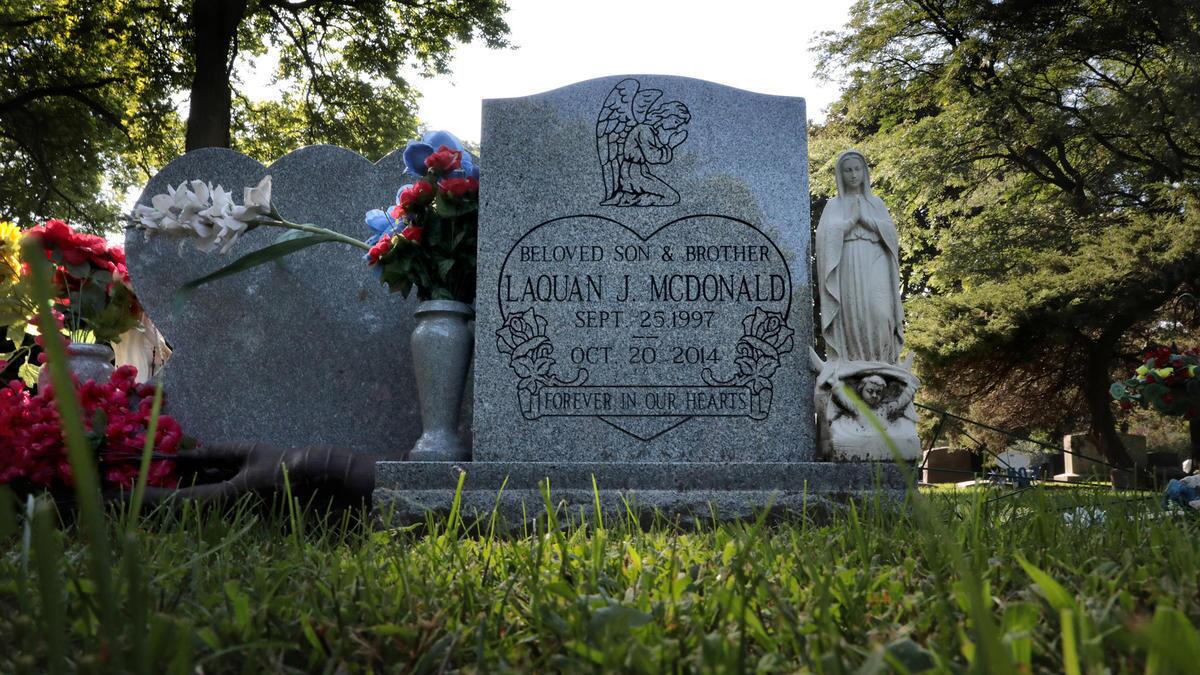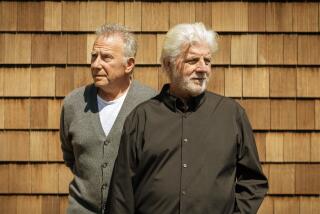‘This kid had an impact on people’: The troubled life and fleeting potential of Laquan McDonald

- Share via
Reporting from CHICAGO — The summer before he was killed, Laquan McDonald walked through Chicago’s Loop to get a copy of his birth certificate with a mentor who was helping him find a job.
It marked, the mentor recalled, the teen’s first time exploring on foot the bustling downtown, less than 10 miles from the impoverished West Side neighborhood where McDonald grew up but seemingly a world away from its violence.
Passersby approached apprehensively at the sight of McDonald — 6-foot-2 with short dreadlocks, baggy clothes and a chipped front tooth — so the mentor coached him how to dispel negative stereotypes with eye contact and a smile.
The two had become tight after the adult opened up to the troubled youth about how he, too, had to learn to navigate the city’s long-standing racial fault lines while growing up as a young black man without a father, surrounded by gangs and drugs in a poor neighborhood.
The mentor saw promise in McDonald and encouraged him to believe in himself.
Just weeks after his 17th birthday, McDonald’s 2014 death on a Southwest Side street at the hands of a Chicago police officer drew little attention. More than a year later, that changed with the court-ordered release of a video showing the white officer shooting the black teen 16 times.
The vivid sight of Officer Jason Van Dyke unloading his gun on McDonald as the teen appeared to walk away with a knife in his hand has rocked Chicago unlike any other police-involved shooting in its history.
Now, with opening statements in Van Dyke’s highly anticipated murder trial expected as soon as Monday, a look back at McDonald’s life shows that the odds were stacked against him since birth.
The teen possessed a sense of humor, resilience and love of family that impressed teachers, counselors and probation officers as well as a juvenile court judge.
The Chicago Tribune has reviewed hundreds of pages of state child welfare and county juvenile court records and interviewed relatives, friends and the professionals who tried to show him a better way to reveal a fuller portrait of the lanky teen with the distinctive fast-paced walk.
He was born possibly substance exposed with multiple medical problems to a 15-year-old mother who was in state care due to her own mom’s drug addiction, records show. McDonald’s father was absent nearly all his life due to drugs and prison.
As a toddler, McDonald shuttled between multiple homes. He found stability with his great-grandmother but grew into an angry teen who admitted to smoking marijuana each day by the time he was 11 to help keep a “smile on my face” amid the chaos that plagued his childhood.
McDonald had learning disabilities and complex mental health diagnoses. He was hospitalized three times for psychiatric issues and had repeated school suspensions, expulsions and truancies much of his life.
Arrested 26 times since the age of 13, he was in and out of juvenile detention in the last three years of his life.
When asked what he wanted to do with his life, McDonald on occasion talked about nursing, inspired by his great-grandmother’s long illness. In the final months of his life, he learned how to install drywall, paint and other apprentice tasks on a part-time job rehabbing properties.
His greatest love was family, especially his younger sister, now 18, of whom he was fiercely protective, relatives said. And he was quick to give a hug.
“He was more like a brother,” said Tyniece Hunter, a younger cousin. “A big piece of the family is gone because he was the life of the party. He kept everyone together and smiling.”
His great-grandmother, Goldie Hunter, primarily cared for him since he was 5. A widow and retired laborer with a seventh-grade education, she raised about a dozen children, some her own and others from later generations. They lived in subsidized housing in the city’s rough Austin neighborhood.
McDonald’s mother, Tina Hunter, lived nearby. The state first took custody of her two children weeks before Christmas 2000 when McDonald was 3 because of an accidental radiator burn suffered by his 8-month-old sister, state records show. The Illinois Department of Children and Family Services ruled it was neglect because the children were unsupervised, according to the records.
Hunter regained custody in May 2002, but the state intervened again 13 months later after the mother’s intoxicated boyfriend was accused by staff at the boy’s day care of beating him with a belt on the chest, legs and face because he had misbehaved during a field trip, records showed.
The 5-year-old McDonald went back to live with his great-grandmother. By then, the state had twice placed him briefly in foster homes outside the family. He also had a couple of shelter stays.
But it was during the second foster placement that McDonald complained he had been whipped with an extension cord, barely fed and repeatedly touched in a sexual manner by an older male. His complaint was deemed unfounded for lack of evidence.
Still, records showed, he was never given therapy for sexual abuse despite “being a very angry child with definite aggressive tendencies, and [who] had knowledge of sex beyond his developmental age.”
McDonald received special education services, but his disruptive behavior in school for fighting with other students and disrespecting teachers, along with truancies and suspensions, became a common theme, stunting his progress in the half-dozen or more schools that followed.
When he was hospitalized for psychiatric problems at 11, he showed his emotional wounds on a test asking him to complete partial sentences.
“Bad,” he said when asked to describe his view of the world.
Another question asked: What does every child get?
“Punched,” he said.
He had three psychiatric hospitalizations by 13, the records showed. McDonald had frequent run-ins with police.
He was 13 during his first arrest on allegations of cocaine possession. In all, McDonald was arrested 26 times in a little more than three-year period — from April 2011 to July 2014, according to records. He was never charged as an adult, but prosecutors did pursue seven cases in juvenile court for delinquency, all related to small amounts of marijuana, heroin or cocaine.
He won his freedom back in late May 2014 after a unique hearing involving judges in both the child welfare and delinquency sections of juvenile court. Though some professionals pushed for incarceration, McDonald was given another chance.
Just weeks earlier, while still in lockup, he told a court clinician his life had been “hell” — that he did not have a single happy memory from his childhood. He said the worst thing to ever happen to him was being taken away from his mother. He feared ending up like his absent father, who he said was imprisoned for drugs.
In time, the court gave his mother unsupervised visits with the goal that he and his sister be returned to her care by May 2015. But that was not to be. He was fatally shot on the night of Oct. 20, 2014.

McDonald was pronounced dead on his way to Mount Sinai Hospital, where he was born 17 years earlier. An autopsy report showed PCP in his system.
He is buried in a cemetery in west suburban Forest Park. His great-grandmother and an older relative killed in Chicago gunfire three months after McDonald died are laid to rest there as well.
His mother has never spoken publicly about her son’s death, but other relatives complained about the frequent airing of the shooting video and said coverage of the case has been traumatizing.
“We lose sleep,” said Carlissa Hunter, a great-aunt. “We wonder how his life would have been if he wasn’t killed.”
The family has also expressed concern at reports that the defense might call McDonald’s mother at trial to testify that the teen was violent — allowed because Van Dyke’s lawyers contend the officer acted in self-defense.
No matter the trial’s outcome, the family has pleaded for protesters to remain peaceful and remain hopeful that McDonald’s legacy will be a catalyst for police reform.
At his funeral at his great-uncle’s West Side Baptist Church, his sister, Tariana, read a poem she wrote, while several uncles served as pallbearers.
“Out of everything I read about Laquan McDonald’s life, what stands out most to me is when I reviewed the sign-in [guest] book at the funeral,” said Jeffrey Neslund, the family lawyer. “This kid had an impact on people. He meant something to them.... He wasn’t just this kid with all these arrests. They saw something beyond the rap sheet.”
Gutowski writes for the Chicago Tribune.
More to Read
Sign up for Essential California
The most important California stories and recommendations in your inbox every morning.
You may occasionally receive promotional content from the Los Angeles Times.













